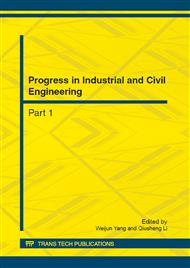p.4664
p.4668
p.4673
p.4679
p.4683
p.4688
p.4694
p.4698
p.4702
A Coarse Grid Correction to Domain Decomposition Based Preconditioners for Meso-Scale Simulation of Concrete
Abstract:
Meso-scale simulation is one of the important ways to study dynamic behaviors of concrete materials, while most of the simulation time is used to solve the sparse linear systems. Because the discrete grid is three dimensional and is of large scale, iterations are the best solutions. But the convergence depends on the distribution of the eigenvalues of the coefficient matrix, to make the eigenvalues distributed more closely each other, it is required to adopt preconditioning techniques. In this paper, with the characteristics of the sparse linear systems considered, there provides a coarse grid correction algorithm, which is based on domain decomposition preconditioners and aggregation of sub-domains, with each aggregated into a single super-node. A linear system with small scale size is formed, which contains the global information and the solution is used to correct the solution components of the original auxiliary linear system. For incomplete factorization preconditioner parallelized with block Jacobi, classic additive Schwarz, and factors combination techniques, the experiments show that the presented algorithm can improve the convergence rate and the efficiency.
Info:
Periodical:
Pages:
4683-4687
Citation:
Online since:
October 2012
Authors:
Price:
Сopyright:
© 2012 Trans Tech Publications Ltd. All Rights Reserved
Share:
Citation:


